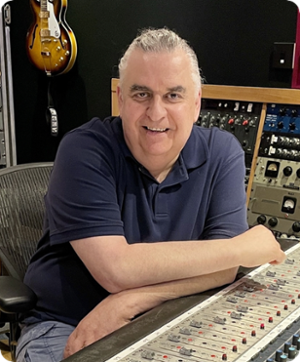A Storied Career in Sound
Q: Can you start by telling us your name, what you do, and a bit of background about yourself?
My name is Glenn Rosenstein. I'm a record producer, recording engineer, and mixer. I also own a couple of recording studios, including Fame Recording Studio—home to legends like Aretha Franklin, Otis Redding, and Wilson Pickett. I've been fortunate to spend a long time in the music industry, and I still love every minute of it.
Q: Just for fun—can you name a few artists you've worked with that we might recognize?
Absolutely. I've worked with Madonna, Talking Heads, Tears for Fears, U2, Ziggy Marley, the Ramones, and Miles Davis, among many others. That's what happens when you've been around a while—you collect stories and some very cool credits.
Embracing the Evolution of Music Tech
Q: Technology has changed the music industry dramatically. How do you see its role in helping artists find their "signature sound"?
Even though I started in the analog era—because back then there wasn't much else—I've always embraced technology. I don't have that "get off my lawn" mentality. I love tools that open up new creative paths. That's why ModPlay got my attention. It's not just another plugin—it's a plugin for plugins. That concept alone is fascinating. As a producer, my job is often to help artists find and refine their sound. While I don't think of myself as someone with a specific "Glenn sound"—my discography is pretty diverse—tools like ModPlay give us a new way to approach that process. It keeps the work fresh and exciting.
First Impressions: Fear and Fascination
Q: What were your initial thoughts when you first used ModPlay?
Honestly? I was a little fearful. It didn't look or behave like anything I'd used before. There were panning options that felt unfamiliar. But the more I explored, the more I saw how it could integrate into my workflow. And once I did, the results were incredibly satisfying. It wasn't complicated—just totally new. And that's a good thing.
Q: You've seen so much in your career—how is it that something still feels new to you?
That curiosity never left me. Since I was 19, I've wanted to know what every knob and button does. I'm still that person. I don't enjoy falling into routine—I love being challenged. Tools like ModPlay bring new philosophies into the studio. They force me to think differently, and I appreciate that.
The Plugin for Plugins
Q: ModPlay is often called the "plugin for plugins." What does that mean to you?
It means flexibility. It's something I'd demonstrate to an artist or collaborator rather than explain in words. I'll use it during a session, and someone will catch something cool and ask, “What was that?” That moment often leads to them taking the idea and running with it in a direction I'd never expect. It's early days for me with this plugin, but so far it's been very rewarding.
Q: Is this kind of tool genre-specific? Or does it cross boundaries?
Great question. I recently used it on a very organic record—nothing electronic or synthetic at all. I used it in a subtle panning mode, and it worked beautifully. The artist didn't say, “Oh, that's for EDM people.” They just loved how it sounded. That's what matters. Once people start using it, I think they'll discover their own unique ways of applying it—regardless of genre. (Though part of me hopes it doesn't catch on too much. I'd love to keep this little secret for myself!)
Final Thoughts: Why You Should Try It
Q: If an artist saw you using ModPlay and asked if they should try it, what would you say?
I'd say, “You've got to check this out.” You owe it to yourself to understand what this does and what it could do for your music. It's not just about presets and parameters—it's about unlocking ideas.
Glenn Rosenstein continues to champion innovation in music, proving that no matter how much experience you bring to the studio, there's always something new to learn. Whether you're a seasoned pro or just getting started, ModPlay is one tool worth exploring



